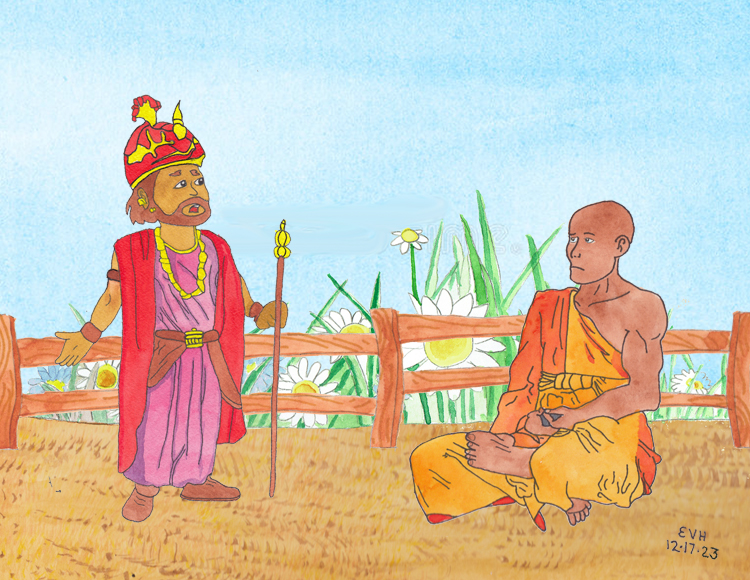
Jataka 473
Mittā Mitta Jātaka
The True Friend
as told by Eric Van Horn
originally translated by H.T. Francis and R.A. Neil, Cambridge University
originally edited by Professor Edward Byles Cowell, Cambridge University
This is a simple story in which the Bodhisatta gives advice to a King about how to know whether or not someone is a true friend.
One problem with being rich, famous, or powerful is that—like the king in this story—you don’t always know who to trust. This theme shows up in the iconic story of Bhaddiya (Jātaka 10). As the story says:
The venerable Bhaddiya used to be a member of the royal family. He was always in danger and had to guard himself as though he were his own protector deity. He had many soldiers, but even so he had trouble sleeping even on his royal couch in his private apartments high up in the palace. Now that he was an arahant, he roamed in forests and desert places without any fear at all. And at that thought he burst into this heartfelt utterance, “Oh, happiness! Oh, happiness!”
“How should the wise?” The Master told this story when he was at Jetavana. It is about an upright courtier of the King of Kosala (King Pasenadi).
This man, they say, was most useful to the King. As a result, the King bestowed great honor on him. The other courtiers were jealous of him, so they accused him of having done things to harm the King. The King made an enquiry into these accusations. But finding no fault in him, he thought, “I see no fault in the man. How can I know whether he is my friend or foe?” Then he thought, “No one except for the Tathāgata will be able to decide this question. I will go and ask him.” So after he finished his breakfast, he visited the Master. He said, “How can one tell, sir, of any man, whether he is a friend or an enemy?” Then the Master replied, “Wise men of old, O King, have pondered this question. They have asked the wise about it, and following their advice, they have discovered the truth. And renouncing their enemies, they have paid heed to their friends.” This said, at his request, he told this story from the past.
Once upon a time, when Brahmadatta was King of Benares, the Bodhisatta was a courtier who advised him on things spiritual and things temporal. At that time, there were many who slandered a certain courtier who was honorable. The King saw no fault in him, so he asked the Great Being, “Now how can one tell friend or foe?” repeating the first stanza:
“How should the wise and prudent strive, how may discernment know,
What deeds declare to eye or ear the man that is a foe?”

Figure: “How can one tell friend or foe?”
Then the Great Being repeated these five stanzas to explain the marks of an enemy:
"He smiles not when you see him, no welcome will he show,
He will not turn his eyes that way, and answers you with No.
“Your enemies he honors, he cares not for your friends,
Those who would praise your worth, he stays, your slanderers commends.
“No secret tells he to you, your secret he betrays,
Speaks never well of what you do, your wisdom will not praise.
“He joys not at your welfare, but at your evil fame,
Should he receive some dainty, he thinks not of your name,
Nor pities you, nor cries aloud—O, had my friend the same!
“These are the sixteen tokens by which a foe you see
These if a wise man sees or hears he knows his enemy.
"How should the wise and prudent strive, what will discernment lend,
What deeds declare to eye and ear the man that is a friend?”
The Great Being, having been questioned in these lines, recited the remaining stanzas:
“The absent he remembers, returned, he will rejoice,
Then in the height of his delight he greets you with his voice.
“Your foes he never honors, he loves to serve your friends,
Those who would slander you, he stays, who praise you, he commends.
“He tells his secrets to you, your secret ne’er betrays,
Speaks ever well of all you do, your wisdom loves to praise.
“He joys to hear your welfare, not in your evil fame,
Should he receive some dainty, he thinks upon your name,
And pities you, and cries aloud—O had my friend the same!
“These are the sixteen tokens in friends established well,
Which if a wise man sees or hears he can a true friend tell.”
The King, delighted at the speech of the Great Being, gave him the highest honor.
The Master, having ended this discourse, said, “Thus, great King, this question arose in days gone by, even as now, and wise men had their say. By these two-and-thirty signs may friend or foe be known.” With those words, he identified the birth: “At that time, Ānanda was the King, and I was the wise courtier.”
